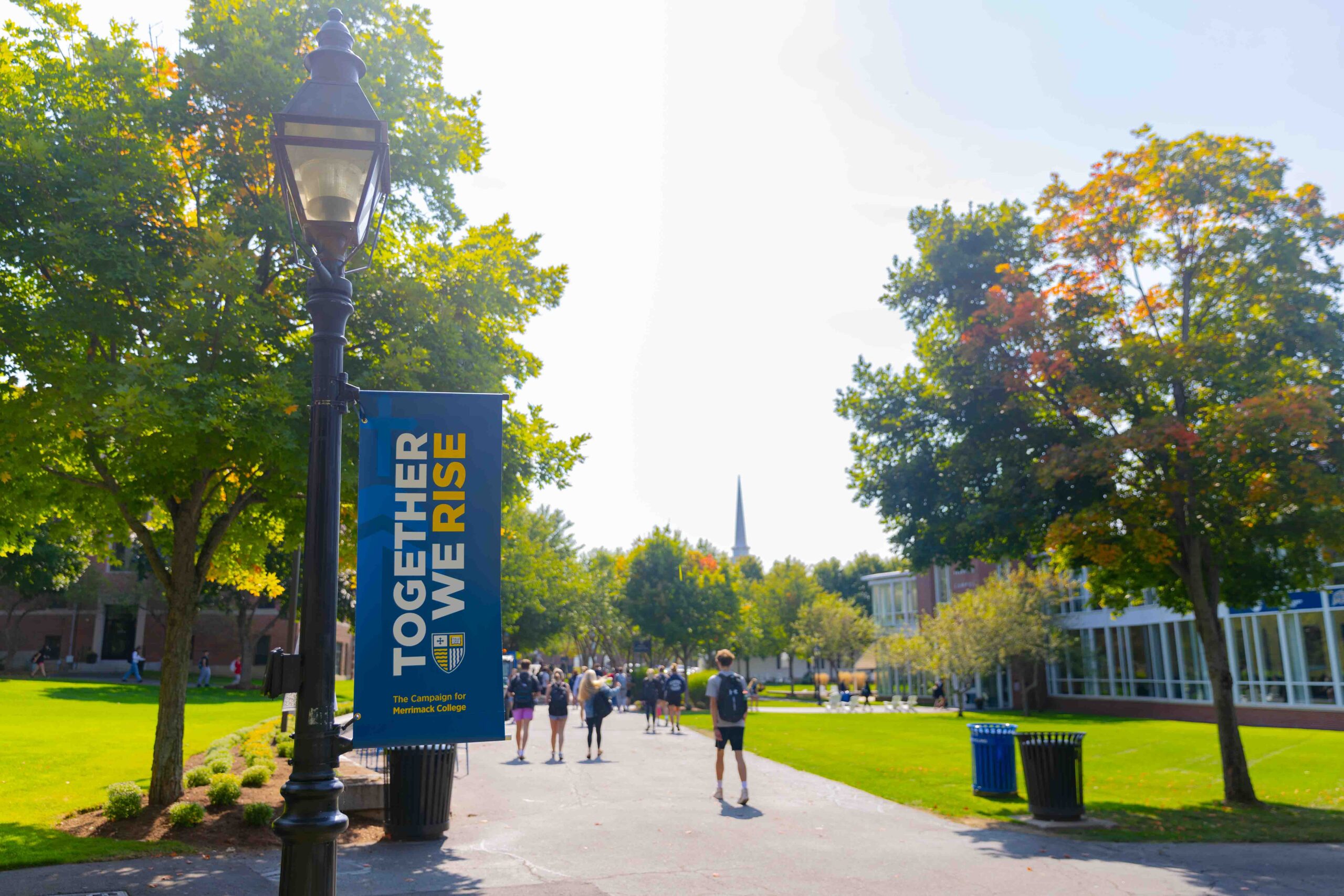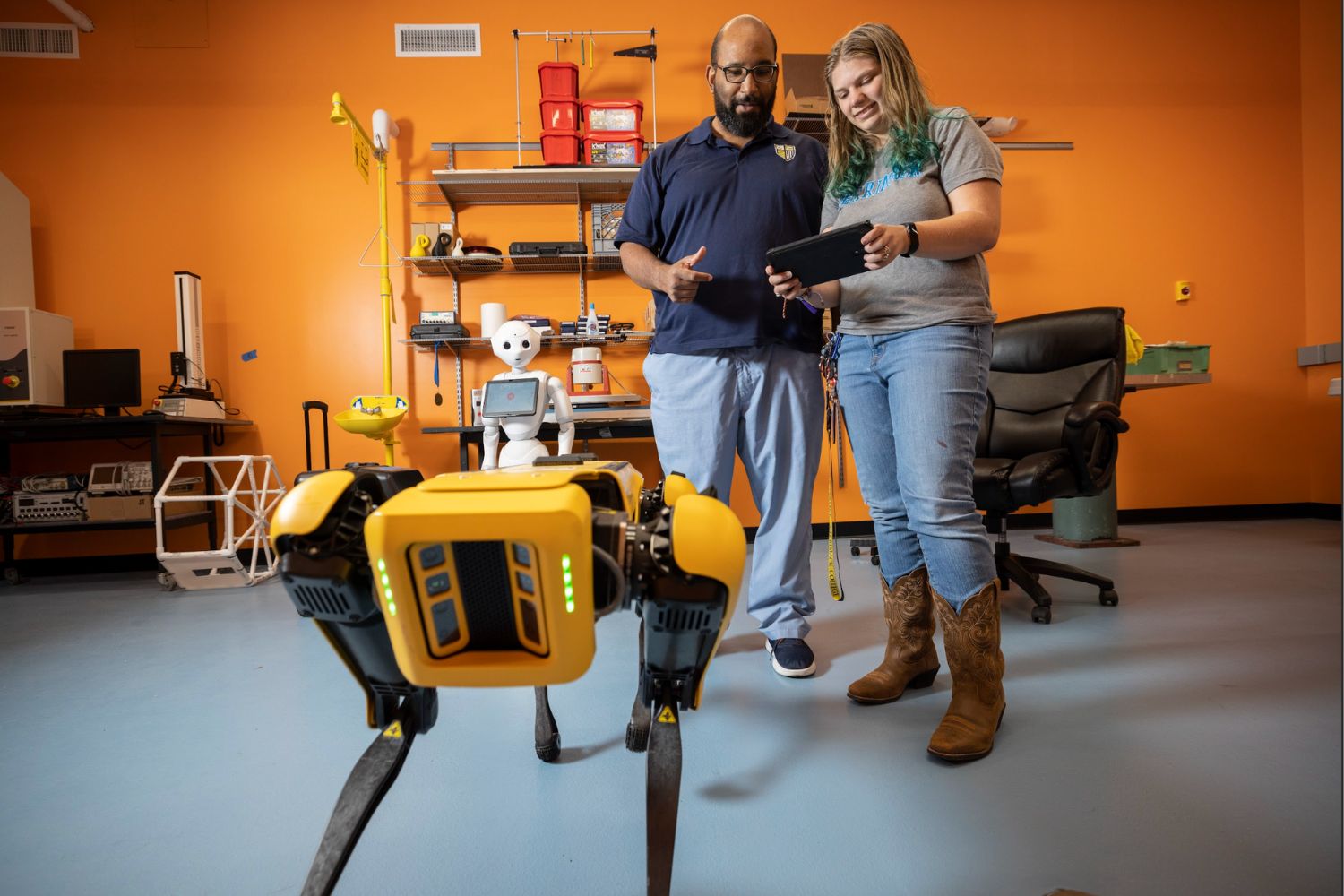Master of Science in Civil Engineering
Merrimack's STEM Designated degree offers both Master's Thesis or Project Options. Full-tuition fellowships available!
Merrimack’s Master of Science in Civil Engineering equips you with the expertise to design, manage, and implement innovative solutions for complex infrastructure and environmental challenges, from sustainable urban development to advanced structural systems.
Civil Engineering Master's Degree at a Glance
Mode of Study
On Campus
Est. Time
2 years full-time; part-time study available
Start Terms
Spring, Fall
View Application Deadlines
Credits
34
STEM Designated
Yes
Accreditation
Fellowships
Full- & half-tuition
Scholarships
Dean Scholarship &
Alumni Scholarship
Tell Me More About Merrimack's Civil Engineering Master's Degree
"*" indicates required fields
Master of Science in Civil Engineering Tuition
Credits
Per Credit
Total Tuition Cost
Tuition for 2025-2026. Rates are subject to change.
Typical Tuition Savings for the M.S. in Civil Engineering
Merrimack College offers generous scholarship and fellowship opportunities to offset your graduate tuition.
Presidential Fellowships are 2-year, 25 hour-per-week field placements and cover $24,650, or 100% of tuition.
Provost Fellowships are 2-year, 15 hour-per-week field placements and cover $12,325, or 50% of tuition.
Double Warrior Alumni Scholarships are awarded to all Merrimack College alumni, covering $8,134, or 33% of tuition, for recent graduates (25% for previously graduated alumni).
Dean Scholarships are merit-based awards offered to eligible graduate students who are not alumni of Merrimack College. These scholarships vary in amount and are awarded based on academic achievement and potential.
Visit the page below to find all up-to-date tuition and fees information.
Overview of Merrimack's M.S. in Civil Engineering
Merrimack’s M.S. in Civil Engineering offers two specialized pathways, enabling students to customize their academic journey to match their interests and professional goals. This program integrates advanced technical knowledge with practical experience to prepare graduates for leadership roles in civil and environmental engineering.
Students gain expertise in areas such as structural design, sustainable infrastructure, geotechnical systems, and water resource management, tackling society’s most critical infrastructure challenges. Each pathway focuses on industry-relevant problem-solving and cutting-edge technologies, providing students with the specialized skills needed to excel in this dynamic and essential field.
Choose One of Two Options
Master’s Thesis Option
Master’s Project Option (a course-based option)

Why Choose the M.S. in Civil Engineering at Merrimack?
INTEGRATED CURRICULUM
This on-ground master’s degree trains you to become a subject matter expert in civil engineering while independently contributing to impactful projects and research. You’ll engage in advanced analysis, design, and experimentation, as well as the development of innovative solutions for real-world infrastructure challenges, guided by your graduate advisor and supported by a team of accomplished experts.
INDUSTRY ALIGNED
Designed to enhance your skills, this program prepares you to excel in the dynamic field of civil engineering. Through immersive, hands-on experiences and mentorship from accomplished faculty, you’ll develop the in-demand skills that top organizations value.
VALUABLE NETWORKING OPPORTUNITIES
At Merrimack, we cultivate an atmosphere that promotes networking and career advancement, and we urge you to form meaningful relationships with experienced, full-time faculty while becoming a part of a close-knit community of peers. Additionally, we offer graduate fellowship opportunities for students opting for the thesis option*, in which students work closely with and in support of faculty research in exchange for a large tuition discount.
FLEXIBLE COURSE SCHEDULE
Our flexible course schedule is designed to accommodate working adults by offering evening classes that allow you to balance your professional, personal, and academic commitments. Additionally, you have the option to study part-time or full-time, which ensures you can continue advancing your education on a timeline that works for you.
*Please note that a fellowship position is not guaranteed for all thesis students. All students (project and thesis) may qualify for a scholarship.
Career Outlook: Where Can a M.S. in Civil Engineering Take You?
This degree can lead to promotions into decision-making roles, leading larger projects, a higher annual salary, and open the door to more opportunities.
Median Annual Salary
For Civil Engineers in the United States in 2024
Employment Growth
Faster than average industry growth in the United States between 2024 and 2034.
Salary Difference
between a B.S. and M.S. in Civil Engineering
15:1
Estimated 20-year ROI*
Sources: Bureau of Labor Statistics (BLS) & Salary.com, 2025
*Estimated Return on Investment (ROI) based on average salary for roles with a Civil Engineering master’s degree in relation to Merrimack’s stated tuition for the program, and a potential salary increase of $20k over 20 years. Actual results will vary depending on career path, location, and individual circumstances.
Jobs with a Civil Engineering Master's Degree
- Senior Engineer
- Project Manager
- Ph.D. Engineering Candidate
- Structural Engineer
- Transportation Engineer
- Environmental Consultant
- Construction Manager
- Urban Planner
Where Merrimack's M.S. in Civil Engineering Graduates Work
Gill Engineering
PE, Project Manager
RESPEC
Project Engineer
AECOM
PE, Structural Engineer III
MBTA
Resident Engineer
What Our M.S. in Civil Engineering Students and Alumni Say

<a href="https://www.podbean.com/ew/pb-n2whv-175f4c9"target="_blank" rel="noopener noreferrer"
Listen to student podcast

What You'll Learn in Merrimack's M.S. in Civil Engineering
Explore Our Two Career-Focused Concentrations
Merrimack’s civil engineering master’s degree program provides a versatile framework that accommodates diverse preferences and career aspirations through the availability of two options: the Master’s Thesis Option and the Master’s Project Option. These paths are designed to accommodate various learning styles and professional ambitions, enabling students to customize their educational journey to align with their academic and career objectives, while also fostering technical expertise and mastery in their chosen field. These options have the same first year of coursework.
Below is a brief overview of each option:
Master’s Thesis Option
The thesis option emphasizes academic research and is ideal for students interested in diving deeply into a specific topic within their field. Under the guidance of a faculty advisor, students will conduct original research, analyze their findings, and present them in a formal written thesis. This process culminates in a defense before a committee. Opting for the thesis route provides a foundation for those considering further academic pursuits, such as a Ph.D., and hones skills in research methodology, critical analysis and scholarly writing. In year 2, the thesis student will take two semesters of thesis work (8 credits) under the mentorship and supervision of a faculty member.
Master’s Project Option
The project option focuses on practical application, allowing students to apply their coursework knowledge to real-world challenges. Instead of extensive academic research, students undertake a significant project, which may be collaborative. This project demonstrates their ability to solve problems, innovate, and produce tangible outcomes. A final report or presentation is typically required, detailing the project’s objectives and results. This option is well-suited for students aiming to enhance their practical skills for direct application in industry or professional settings.
Key Courses You'll Take
Engineering Analysis
GEN 6111
- Application of analytical mathematical methods to civil and mechanical engineering challenges.
- Use of partial differential equations for thermal-fluid, vibration problems, and advanced mechanics topics like fluid and solid mechanics.
- Integration of vector calculus, tensor analysis, analytical function theory, and linear algebra for robotics, structural, and geotechnical engineering applications.
Applied Hydrology
CEN 5032
- Introduction to hydrologic principles, including rainfall-runoff analysis, floodplain hydraulics, and groundwater hydrology.
- Emphasis on computational methods for solving hydrologic problems.
- Use of computer programs to apply hydrologic concepts in practical scenarios.
Introduction to GIS
CEN 5071
- Application of emerging technologies like Geographic Information Systems (GIS) and remote sensing in environmental science, with basic instruction in GIS software.
- Exploration of topics such as water resource mapping, floodplain modeling, watershed networks, terrain analysis, and geospatial data integration.
- Hands-on exercises and a collaborative project tailored to student interests.
Master of Science in Civil Engineering Curriculum
View Full Curriculum from the Graduate Catalog
M.S. in Civil Engineering Requirements
To see more details about the program, please visit catalog.merrimack.edu.Skills You'll Learn
Merrimack’s civil engineering master’s degree will enable you to explore advanced concepts, such as the significance of financial and societal impacts on project outcomes, and learn to seamlessly integrate cutting-edge technologies with existing solutions to ensure optimal project results.
In this 34-credit program, you will:
Deepen your understanding of core civil engineering principles, including structural analysis, geotechnical engineering, transportation engineering, or water resources.
Develop skills in project management, including planning, scheduling, budgeting and resource allocation to ensure the successful execution of engineering projects.
Obtain knowledge about eco-friendly design principles and how to incorporate sustainability into your projects.
Develop research and advanced design skills, and learn how to implement innovative solutions for real-world engineering problems.
Gain an understanding of construction practices, site management, and quality control is important in civil engineering. Students may learn how to oversee construction processes effectively.
Expand your skills in technical writing, presentation, and collaboration to convey ideas and results to both technical and non-technical audiences.

Research by the Numbers
Student Research Experiences
Hear from some of our undergraduate & graduate students about their work.
In Research Grants Awarded
This is only the starting point for sponsored research at Merrimack College.
Peer Reviewed Search Publications
Our faculty are busy constantly conducting research to advance our community.
For Education & Community Service
Our faculty play an important role in the national & global research ecosystem.
Featured Faculty
Joel Kuszmaul, Ph.D.
Director, Program Assessment & Accreditation & Associate Professor, Civil Engineering
Dr. Joel Kuszmaul is the Director of Program Assessment & Accreditation and an Associate Professor of Civil Engineering at Merrimack College. His research specializes in probabilistic methods in geomechanics, with a focus on levee and dam stability, including long-term collaborations with the U.S. Army Corps of Engineers. He holds a Ph.D. in Civil Engineering from UC Berkeley and advanced degrees in geoengineering and geological engineering.
James Kaklamanos, Ph.D.
Professor, Civil Engineering
Dr. James Kaklamanos is a geotechnical engineering expert specializing in earthquake-induced ground motion prediction and seismic hazard analysis. He joined Merrimack College in 2012 and has taught courses in geotechnical and earthquake engineering, engineering mechanics, and statistics. An accomplished researcher and educator, he has contributed to seismic hazard model improvements and consulting for infrastructure projects nationwide. Professor Kaklamanos has earned numerous accolades, including the ASCE Early Career Educator Award, and actively serves in professional organizations like USUCGER and the Seismological Society of America.
Marc Veletzos, Ph.D.
Professor, Civil Engineering
Dr. Marc Veletzos is a Professor of Civil Engineering at Merrimack College and a recognized expert in earthquake engineering and structural analysis. A Fulbright Senior Scholar in Nepal and licensed professional civil engineer, he specializes in the resilience and rapid repair of bridges after extreme events, seismic design of vernacular buildings in developing countries, and advanced modeling of segmental bridges. His work integrates academic research with practical applications, including training workshops and published guidelines for emergency response. Dr. Veletzos earned his Ph.D., M.S., and B.S. in Structural Engineering from the University of California, San Diego, and has received multiple awards for his contributions to teaching and research.
Sadegh Asgari, Ph.D.
Associate Professor, Civil Engineering
Dr. Sadegh Asgari is an Associate Professor of Civil Engineering at Merrimack College and serves as the Director of Civil Engineering M.S. Programs and the Founding Director of the Construction Management B.S. Program. His research focuses on advancing decision-making tools and technologies for analyzing and designing complex infrastructure systems, leveraging artificial intelligence, mathematical modeling, and simulation techniques. With a Ph.D. from Columbia University, his expertise includes game theory, operations research, and sustainable infrastructure. Dr. Asgari is a recipient of several teaching and research awards, including the Edward G. Roddy Outstanding Teacher of the Year.
Cynthia Carlson, Ph.D.
Chair & Associate Professor, Civil Engineering
Dr. Cynthia Carlson is the Chair and an Associate Professor of Civil Engineering at Merrimack College. Her research explores the intersection of civil engineering, public health, and education, focusing on enhancing walkability, improving water quality, and developing effective stormwater management strategies. With a Ph.D. from the University of New Hampshire, she is also dedicated to advancing hands-on, experiential learning methods for aspiring engineers. Dr. Carlson has received several honors, including the Best Policy-Oriented Paper Award from the ASCE and the Young Engineer of the Year Award in New Hampshire.
Gain Personalized Support from Our Success Coaches
Our Success Coaches are very important to your overall student experience. Throughout your time working towards your degree, your assigned Success Coach will help address many of the questions you may have outside the classroom. In doing so, they will help free more of your time to concentrate on mastering the content that is so important to your program progression.
Once you are accepted into your graduate program, your Success Coach will contact you via your student email. You will engage with your Success Coach from the time you are admitted until you graduate, allowing you to have a consistent point of contact as you work to achieve your goals. Many of our students and alumni appreciate the impact that their Success Coach had in their graduate journey.
At Merrimack College, you’re going to get all of the support that you would need to be successful. [...] Once the program starts, you are linked with a success coach who checks in with you regularly.
Merrimack College Graduate Program Alum
Fellowships, Scholarships, and Financial Aid
Civil Engineering Graduate Fellowships
Civil Engineering graduate fellowships are designed specifically for students enrolled in the Thesis Option in our Master of Science in Civil Engineering. These fellowships allow students the opportunity to earn hands-on experience as a graduate research assistant alongside an esteemed faculty member from the School of Engineering and Computational Sciences.
The following types of graduate fellowships are available:
- Presidential Fellowships: Cover 100% of your graduate tuition and include a 2-year, unpaid fellowship placement of 15 hours per week.
- Provost Fellowships: Cover 50% of your graduate tuition and include a 2-year, unpaid fellowship placement of 15 hours per week.
Scholarships and Financial Aid
Merrimack College offers scholarships for students who are not receiving a full- or half-tuition fellowship. Our scholarship opportunities available to M.S. in Civil Engineering students include:
- Dean Scholarship: Determined by academic merit and financial need. Students not receiving a fellowship are automatically considered for a Dean Scholarship upon applying.
- Double Warrior Alumni Scholarship: Available to all Merrimack graduates. Students enrolling immediately after senior undergraduate year automatically receive a 33% discount, and 25% thereafter. Please note that Double Warrior alumni scholarships cannot be combined with Dean Scholarships.
Financial aid in the form of federal aid, private loans, and payment plans are also options available for graduate students. Click the link below to learn more about our scholarships and financial aid opportunities.
Application Information for the M.S. in Civil Engineering
It’s easy to apply online! Simply create your account by registering a username and password. This will allow you to start an application, save and log back in at any time to complete it before submission.
A Completed Application Includes:
- Online application
- Official college transcripts from all institutions attended
- Resumé
- Interview OR personal statement
- Contact information for one reference OR one letter of recommendation
Important Information:
- No application fee or GRE requirement.
- If applying for a fellowship, be sure to indicate that on your application.
- Optional: Submit test scores to enhance or support your academic background.
The M.S. in Civil Engineering has both Fall and Spring start terms.
Graduate Community and Student Support
As a graduate student at Merrimack College, you are welcome to visit campus and explore our resources to help you optimize your educational journey.
Our graduate students benefit from:
A dedicated success coach to support you throughout the program
A warm, inviting place to meet and network with faculty and peers face-to-face
All resources in our campus library to aid in your studying and research
Access to Merrimack's IT Help Desk
Availability of counseling and wellness services


Want to Learn More about the Master of Science in Civil Engineering?
Contact the Program Director, Dr. Joel Kuszmaul
Take the Next Step (We're Here to Help)
At Merrimack, we are ready to meet you where you are and get you where you want to go. And, we make the process simple along the way! Please feel free to contact our Graduate Admission team or join us at an upcoming event if you have any questions regarding scholarships, fellowships, financial aid, or the application process.
Programs Related to the M.S. in Civil Engineering
Explore other areas and where they can take you.
Grad Chat Podcast
Check out this episode featuring three great faculty members from the Civil Engineering program—Cynthia Carlson, Maria-Isabel Carnasciali and Jared Peterson. Together, they share their expertise and insights into what makes this master’s program a standout choice for aspiring civil engineers. Listen in to learn how this program is designed to equip students with advanced technical expertise, real-world problem-solving abilities and a deep understanding of sustainable engineering practices. Plus, hear about the unique networking opportunities, scholarships and fellowships that make Merrimack a standout choice for your graduate journey.
Check us out on social media!
What's New at Merrimack
Merrimack College Awards & Recognition
U.S. News & World Report | Best Regional Universities North (2026)
- Most Innovative Schools (#8)
- Regional Universities North (#38)
- Best Undergraduate Teaching (#20)
- Best Colleges for Veterans (#16)
- Best Value Schools (#52)







